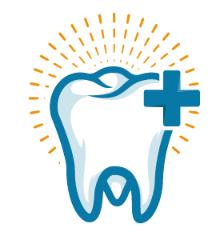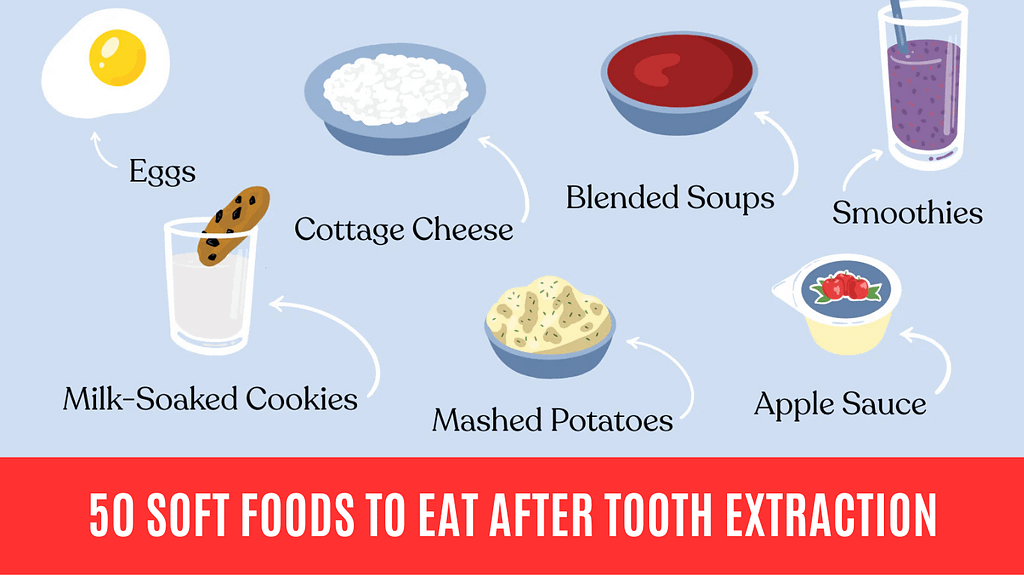After tooth extraction, it’s crucial to monitor eating patterns and make conscious choices to avoid hard foods. You may be wondering what to eat after tooth extraction.
Hard foods can hinder recovery and cause severe complications after dental surgery. Chewing hard food might damage the stitches and cause blood clots to dislocate from their sites.
Good nutrition, especially when consuming cold liquid and soft diet foods, is pivotal in speeding the healing process after tooth extraction or oral surgery.
These oral directions will provide a complete guide on the dental soft food diet list and what should be avoided post-extraction to speed up the recovery.
Stay tuned for the list of 50 soft food items that can be consumed after the tooth extraction.
50 Soft Foods Recommended by Dentists to Eat After Tooth Extraction
After dental surgery , the following 50 soft diet foods are recommended for consumption.
- Avocado
- Applesauce
- Bananas
- Broth
- Milkshakes
- Cheesecake
- Clams
- Creamy polenta
- Cottage cheese
- Custard
- Deli meats
- Fruit sorbet
- Blended fruit and yogurt popsicles
- Tapioca pudding
- Soft-cooked lentils
- Soft bread soaked in milk/soup
- Mashed pumpkin
- Pureed spinach
- Rice pudding
- Quinoa (well-cooked)
- Porridge
- Egg salad
- Soft-cooked vegetables
- Chia pudding
- Crab or shrimp bisque
- Risotto
- Soft-cooked pasta
- Ground chicken
- Hummus
- Ice cream
- Jello
- Juice
- Macaroni and cheese
- Mangos
- Mashed potatoes
- Mashed vegetables
- Meatballs
- Meatloaf
- Ground chicken
- Ice cream
- Baked beans
- Spaghetti
- Sweetbreads
- Tapioca
- Tea
- Smoothie bowls
- Mashed cauliflower
- Eggs
- Fish
- Greek yogurt
After tooth extraction, these 50 soft foods will be beneficial as they are rich sources of nutrition. When prepared well, these simple meals also taste delicious after dental surgery.
How Long Do You Have to Eat Soft Foods After Oral Surgery?
Most of the time, after oral surgery, it is best to stick to a soft diet for at least a week, depending on how complicated the surgery is.
It is easier for the patients to follow a soft food restriction for only a few days following wisdom tooth extractions and similar minor surgeries.
However, the soft food recovery time might be more than two weeks for dental procedures that are more involved, such as the placement of dental implants or surgery on the jaw. It makes the patients confused about what to eat after mouth surgery.
Soft foods will minimize the irritation caused to the operation area and help reduce the chances of complications, such as infection or dislocation of the stitches.
For the first few days, your intake should comprise pureed substances like yogurt, pureed apples, mashed potatoes, and so on, and you should not need to bite or eat much. All these soft foods make the best ideas for dinner or supper as they are easily digestible after dental work.
After two or three days, when you have begun to feel better, and the swelling of your cheeks has started to lessen, you may also add soft-chewable foods, although until the doctor gives a proper clearance, avoiding complex and crunchy foods is a must.
Dos and Don’ts After Tooth Extraction
Dos post Tooth Extraction:
- Follow Post-Op Instructions: Adhere strictly to the guidelines provided by your dentist or oral surgeon.
- Take Medications as Directed: Follow your dentist’s instructions for any prescribed medications to manage pain and prevent infection.
- Use Ice Packs: Apply ice packs to the area to reduce swelling and ease discomfort.
- Elevate Your Head: Use pillows to keep your head elevated while sleeping to minimize swelling.
- Stay Hydrated: Drink plenty of water, but avoid using a straw to prevent complications.
- Maintain Oral Hygiene: Brush your teeth gently, avoid the extraction site, and rinse with the prescribed saltwater solution.
- Eat Soft Foods: Stick to a soft-food diet to prevent irritation to the extraction site.
- Rest and Recover: Ensure adequate rest and avoid heavy activities to support healing.
- Avoid Smoking and Tobacco: Do not smoke, as it can interfere with healing and increase complications.
- Attend Follow-Up Appointments: Keep all scheduled follow-up visits with your dentist to track your recovery progress.
Don’ts after Tooth Removal:
These 9 things should be avoided after tooth extraction to speed up the recovery and healing process:
- Steer away from crunchy and hard foods, as more force is applied when chewing them, which can lead to injuries to the extraction after surgery.
- Try to avoid touching the extraction site, as it can impede the healing process. Avoid using your fingers, tongue, or other object to touch, poke, or prod the extraction site.
- Avoid straws after dental surgery for 7-10 days post extraction. The pressure created due to sucking straw can dislocate the blood clots and can also lead to dry sockets.
- Avoid rinsing too vigorously, as it can dislocate the blood clot and slow recovery after extraction.
- Don’t consume hot foods and beverages, as they can cause discomfort and irritation to the gums.
- Avoid spicy foods, which can cause gum irritation and inflammation.
- Aspirin can cause thinning of blood, therefore causing bleeding to the extraction site; try to avoid taking aspirin without dentists’ recommendation.
- Restrict alcohol intake since it may interact with drugs and impede the healing process.
- Avoid smoking for at least 48 hours after the tooth extraction. Smoking can tremendously increase the risks of infections and also cause gum irritation.
Read More: Is Laser Cleaning Necessary After Deep Cleaning?
Takeaway
After tooth extraction, eating soft and easy-to-chew foods is recommended only to ease recovery and prevent issues such as irritation or cutting stitches.
Soft foods like yogurt, mashed potatoes, smoothies, and scrambled eggs are good for the body and the extraction site as they are easy to chew.
Foods or warm drinks should be highly restricted since they promote inflammation, which is undesirable during this phase.
After oral surgery, a simple, balanced diet composed of soft pureed fruits, soft vegetables, soft pasta, soft soups or broths, etc., will help people remain healthy and give their mouths time to heal from the surgery.
Read More: When to Stop Gauze Use After Tooth Extraction?
FAQs
What are soft foods after tooth extraction?
Soft foods refer to food that can easily be chewed and swallowed and include food types such as yogurt, mashed potatoes, applesauce, and soft foods such as untoasted bread and pudding for surgical recovery without aggravating the operated area.
Can I eat noodles after tooth extraction?
Yes, you can eat noodles post-extractions as these are included in soft foods and don’t interfere with the healing procedure.
What foods heal oral surgery?
Smoothies, lean spit, mashed veggies, and soft fruit rich in nutrients like protein serve these activities. They are essential in post-surgery conditions to provide the nutrients well known for decreasing inflammation, synthesis of protein, and repair of tissues.
Can I eat rice after tooth extraction?
Rice is easily digestible and doesn’t require hard chewing, so you can eat soft-cooked rice.
What foods heal oral surgery?
There are several liquid and soft foods that most dentists recommend to their patients for quick recovery. Milkshakes, pudding, yogurt, smoothies, ice cream, and sorbets offer quick healing to the gums after oral surgery.

